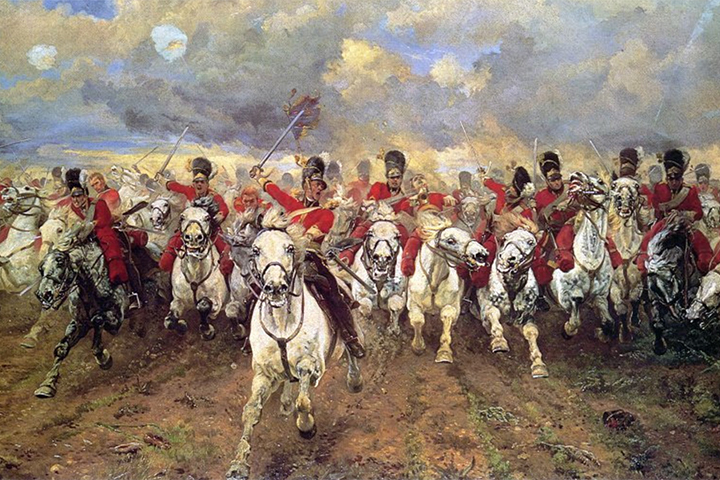It is only right that when we think of courage, we think of profound sacrifice, suffering, and voluntary risk on behalf of the innocent. The most common icons of courage are soldiers and martyrs, after all, and this is fitting given that soldiers and martyrs offer up not just their comfort or wealth, but their very lives. However, when teaching courage to high school students, it is fitting also that we should think of laughter, for the sound of laughter is a cracking whip that terrifies young men and women.
Several years ago, while rounding out two months of lectures on the saga of King David, I asked a class of seventh grade boys to choose whatever passage they liked from the story and write a short homily about it. I told them their homilies should be addressed to their fellows, encouraging and exhorting them to virtue in some area in which they were commonly tempted. In retrospect, the results of the assignment were not terribly surprising. Most of the boys chose the story of David and Goliath, which is arguably the most iconic depiction of courage in all of literature. The homilies they built from the account of David’s courage were not all that helpful, though, for they all concerned great and noble deeds. They exhorted one another to share the gospel with their travel soccer teams, to stand up to bullies, and to someday become missionaries and soldiers. While none of these exhortations struck me as improper, they did remind me of Aristotle’s claim that young people tend to “overdo everything.”
As a high school teacher, I do not yet need students with great courage—just the courage appropriate to overcome the thousand small temptations to cowardice and sloth which emerge over the course of the day. He who is faithful in little will be faithful in much, which means that students who want to someday risk their lives for the innocent should gain practice risking their egos and their pride today. I had asked my students to address an area of common temptation, and to be frank, the battlefield and mission field were simply too far off. My students were eager to exhort their fellows to courage in unusual situations, situations in which they rarely found themselves. At so young an age, courage rarely requires the shedding of blood. For most high school students, courage simply means being willing to be laughed at. “What your teachers need the most,” I told my students when handing back their work, “is your willingness to be embarrassed for following mundane, unglamorous rules.”
I know that teenagers are sometimes tempted by weighty sins and crimes, but such temptations are typically born of continual, habitual resignation to temptation in small matters, like breaking the dress code, cheating on tests, using cell phones during the school day, and disappearing at lunch. Of course, such “crimes” really are quite trivial, and so taking a stand against them often means adopting a mock-heroic quality that is easily ridiculed. On a battlefield, no honest soldier scorns his enemy for defending home and hearth. Two soldiers charging at one another have no cause to crack jokes at the other’s expense. The same is not true of two boys in the restroom, one of whom is using his cell phone against school rules, and the other of whom is saying, “Put it away. That’s not right.” Such opposition is ripe for sneering and jesting. Such opposition will earn the cracking whip of laughter.
Absolutely no one enjoys being laughed at, but the young hate it more than the elderly because, as Aristotle says in his Rhetoric, “owing to their love of honor they cannot bear being slighted, and are indignant if they imagine themselves unfairly treated,” which means the high school student who is courageous in small, daily temptations must endure a kind of suffering which he finds particularly loathsome and distasteful.
Similarly, no one enjoys a bee sting, especially those who are allergic to bee stings, and teenagers are allergic to the indignation which accompanies a slight. The teenager who sticks up for the rules is not likely to get kicked and jabbed but jeered and mocked. Most adults have clocked their own failures often enough that loving honor seems pure fantasy. At thirty-eight, I have said and done enough foolish, embarrassing things (and meditated sleeplessly about who has noticed) that “my honor” strikes me as fair game. It is not so with the young, Aristotle argues, for they think too highly not only of themselves, but of everyone, for they have “not yet witnessed many instances of wickedness.” What is more, the young “trust others readily, because they have not often been cheated,” which means that the mockery that common courage earns is, paradoxically, both predictable and surprising. By middle-age, it is only predictable.
Common courage ultimately matures into great courage, and yet it is dangerous to grasp at greatness too early, for it usually means an unwillingness to undertake the drudgery that attends practice. Mockery is adverse to the teenage temperament, so much so that the sixteen-year-old who becomes accustomed to being laughed at will be well-prepared, by the age of twenty-six, to be shot at.
“If the jeers of your fellows feel like knife blades,” I told my students, “you will be ready when they become actual knife blades.” Do not withhold examples of great courage from your students, but do not fail to appropriate those examples to common, mundane temptations to vice. If a student is willing to be laughed at for God and country (and school), that student will certainly be willing to die for God and country, as well.
# # #
Joshua Gibbs teaches humanities at the Veritas School in Richmond, Virginia. He is the author of the book How to Be Unlucky: Reflections on the Pursuit of Virtue, and he blogs about education here.

